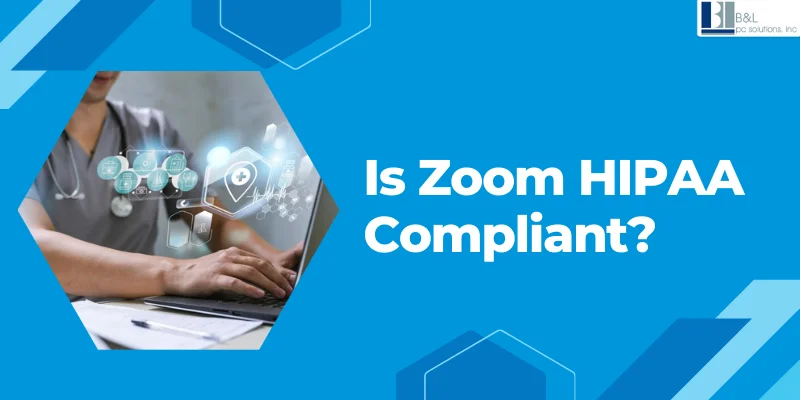
With a rise in telehealth and remote work, Zoom has become an integral part for virtual interactions. Handling patient-sensitive data raises safety and compliance. Imagine consulting on an online platform, going through a patient's medical history, when suddenly a question dashes across your mind: Is Zoom HIPAA Compliant? Is it safe to facilitate virtual consultations for healthcare professionals? What security protocols are present to guard against breaches of patient data?
If these questions ever came to your mind, that is no wonder. Such fears of video conferencing applications being HIPAA compliant are troubling every doctor, therapist, and healthcare business in the land. A single error in security might result in legal suits, monetary fines, and, essentially, the loss of patient trust. This blog will discuss whether Zoom is HIPAA-compliant, how to use it safely, and other options if Zoom isn't right for you. Let's get into it and find out!
What Exactly Is HIPAA Compliance and Why Should It Matter?
This section should concern HIPAA compliance with Zoom.
What Is HIPAA?
The Health Insurance Portability and Accountability Act is a compulsory federal law that makes very tough demands on protecting data privacy and security guidelines for electronic Protected Health Information (ePHI). It requires that any agency managing patient data comes under the purview of three rules, which are:
- The Privacy Rule limits PHI's usage and dissemination except by obtaining a patient's consent.
- The Security Rule sets the administrative, physical, and technical safeguards the Covered Entity must establish to safeguard electronic PHI (ePHI).
- The Breach Notification Rule tells affected patients and law enforcement what to do after a covered entity's unprotected health information is breached.
HIPAA-compliant communications services and systems should be chosen with great care by persons rendering Healthcare, billing avenues of Healthcare, or businesses for activities concerning the exchange of PHI.
Is Zoom HIPAA Compliant?
Yes, Zoom can be HIPAA compliant, but only if you use Zoom for Healthcare and set it up correctly. To meet HIPAA requirements Zoom provides a Business Associate Agreement (BAA) so patient data is secure. Zoom for Healthcare has all the necessary security features end-to-end encryption, access controls, waiting rooms, passcodes and locked meetings to prevent unauthorized access. But the free and standard Zoom plans are not HIPAA compliant by default. Healthcare providers must use Zoom for Healthcare and set up the security settings to be compliant. The free and standard Zoom plans are NOT HIPAA compliant by default.
Read More Blog : List of Top 10 HIPAA Violation Examples Explain
Regular Zoom vs. Zoom for Health Care
1. Standard Zoom (Free & Pro versions) is NOT HIPAA compliant because:
- By default, it doesn't offer a Business Associate Agreement (BAA).
- Standard encryption does not guarantee total PHI protection.
- Cloud recordings are not secured for HIPAA compliance.
2. Zoom for Healthcare is HIPAA compliant as it has:
- Included a signed Business Associate Agreement (BAA).
- Enhanced security and encryption.
- Controlled access and management of PHI data.
If you intend to use any protected health information, you MUST use Zoom for Healthcare and sign a BAA with Zoom.
How to Make Zoom HIPAA Compliant?
To remain HIPAA-compliant while using Zoom, one must follow some simple rules:
1. Get Zoom for Healthcare
- Go to Zoom's homepage and register for Zoom for Healthcare.
- Ask Zoom to provide and sign a Business Associate Agreement.
2. Modify Zoom Security Settings.
- Enable E2EE to safeguard data in transit.
- Please turn off the automatic cloud recording unless it is securely stored.
- Utilize strong passwords and waiting rooms to prevent unauthorized access.
- Configure screen-sharing restrictions to prevent inadvertent PHI disclosures.
3. Control Access to Protected Health Information (PHI)
- Limit participation in meetings containing PHI.
- Carefully assign host and co-host permissions.
- Using role-based access control, limit admin privileges.
4. Employee Training Regarding HIPAA Compliance:
- Regularly train staff on the HIPAA requirements for covered entities and business associates.
- Teach the use of secure communication methods (e.g., do-not-chat PHI).
- Conduct periodic audits of HIPAA compliance.
These processes ensure that the Zoom platform is secured in the context of healthcare and HIPAA-regulated industries.
Zoom's HIPAA Compliance Features
When utilizing Zoom for Healthcare, the following features present themselves:
1. Business Associate Agreement (BAA)
Assures that Zoom is legally obliged to protect against PHI.
2. End-to-End Encryption (E2EE)
Ensure that the data is secured to prevent any leaks.
3. Secure User Authentication & Access Control
Permits role-based meeting locks and permissions.
4. Audit Trails & Activity Logs
Monitor logins and meetings, along with data access.
5. Cloud Storage (If Enabled)
Secure data storage options that meet HIPAA compliance standards.
As a result, these may be HIPAA-compliant features in Zoom, but actual use will make one compliant.
Read More Blog: All About HIPAA Compliance Software: Features, Pros and Cons
Risks and Limitations of Using Zoom for HIPAA Compliance
Currently, even with the Zoom for Healthcare option, there still exist some risks:
- Human Error – Employees may accidentally expose PHI.
- Cloud Recording Risks – This must be secured to prevent breaches.
- Third-Party Integrations – Some Zoom add-ons may not be HIPAA compliant.
- It completely lacks default compliance; manual configuration is required for security.
Implementing stringent security protocols and providing regular training for the various teams within an organization can only address these issues.
Best HIPAA-Compliant Alternatives to Zoom
Is Zoom just not cutting it in terms of your compliance needs? Then, you can pay a visit to the secure alternatives below:
- Microsoft Teams (With BAA): Enterprise security and integration.
- Google Meet (With Google Workspace BAA): Google Security with HIPAA Compliance
- Doxy.me: Specifically built for telehealth providers
- GoToMeeting (With BAA): Secure Business Friendly Conferencing
These services do not share the exact specifications; you must choose which best suits your compliance and security requirements.
FAQs For Zoom HIPAA Compliant
1. Can standard Zoom be used for a HIPAA-compliant meeting?
No. Regular Zoom is NOT HIPAA-compliant as it doesn’t include a Business Associate Agreement, does not guarantee total PHI protection, and is not secured for HIPAA compliance.
2. How can I get my Zoom account to become HIPAA compliant?
Zoom for Healthcare should be subscribed for HIPAA compliance by:
- Subscribe to Zoom for Healthcare.
- Sign a Business Associate Agreement (BAA) with Zoom.
- Follow best security practices.
3. Is Zoom HIPAA compliant for therapists?
Therapists may use Zoom for Healthcare, provided that they:
- Sign a BAA with Zoom.
- Enable secure settings such as encryption and meeting controls.
- Keep PHI not stored in unsecured locations.
4. Does Zoom end-to-end encryption support HIPAA?
Yes, Ensure that the data is secured to prevent any leaks. Make sure you have turned it on.
5. Is the Zoom recording done in compliance with HIPAA?
No, unless securely stored and restricted. It is advisable to turn off cloud recordings when PHI is involved.
Conclusion:
In essence, technically speaking, Standard Zoom is NOT HIPAA-compliant because there are no significant security features. Nonetheless, Zoom for Healthcare services complies with and is entirely secure for PHI. HIPAA compliance requires any organization to sign a Zoom Business Associate Agreement (BAA). This agreement includes stringent security specifications, including end-to-end encryption and access control. The most integral part of training is data misuse prevention, potential legal actions against the company, and high penalties.
If you handle patient data, you must comply with HIPAA. Contact B&L PC Solutions today for CyberSecurity Services Long Island, IT security & compliance consulting!
Tags: HealthcareIT, HIPAACompliance, Is Zoom HIPAA Compliant, PatientPrivacy, PHISecurity, ZoomForHealthcare





